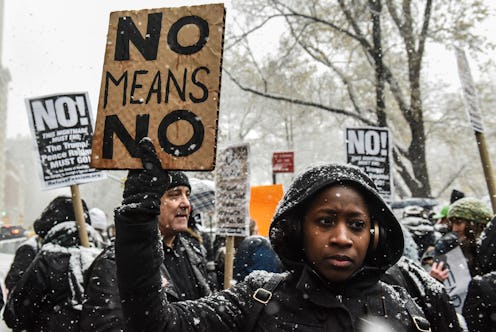News
Nearly Half Of Americans Don’t Actually Understand What Sexual Harassment Is

As the #MeToo movement sweeps the globe and numerous men in powerful positions are being outed as sexual predators, it's become clear that Americans have very different ideas about what constitutes appropriate behavior. Nearly half of American adults don't understand what sexual harassment includes, according to a new study. And it comes as no surprise that women, and specifically women of color, have a broader definition of what should be considered sexual harassment than men do.
It already came out that some men don't understand when hugging female co-workers is OK (spoiler alert: it's safer to assume that it's not OK), and that men are worried about having to stop flirting entirely, in order to avoid accusations of sexual harassment. According to this new Reuters/Ipsos national opinion poll, though, hugging is even more of a confusing topic for many American adults than the previous news had outlined. Apparently, 44 percent of adults agree than nonconsensual hugging is indeed sexual harassment — but another 40 percent of people believe that it is not. Put another way, less than half of American adults believe that giving someone a hug without their consent is unacceptable. When you look at the demographic breakdown on this statistic in particular, it reveals the problems that the country still has to face as it works on eradicating sexual harassment in the workplace altogether.
The difference between responses to the question about "hugging you without your consent" is particularly striking when you look at racial minorities compared to white adults. Thirty-nine percent of white adults believe that it isn't sexual harassment — while 52 percent of adults from minority groups believe that it is. This is fairly representative of the results of the entire poll, which revealed across the board that men have a far more permissive view of what constitutes sexual harassment than women and minorities do. Correlation doesn't imply causation, but it's worth noting that women and minorities are far more likely to experience sexual harassment in the workplace than men are.
Other areas that the poll looked at include nonconsensual touching, which only 11 percent of women said was not sexual harassment, but which 19 percent of men said was acceptable behavior. There was a similar divide when the poll asked about “unwanted compliments about your appearance,” which women found to be significantly less acceptable than men, and which minority women found to be even less acceptable than white women did.
Many commentators have already pointed out that the movement to eradicate sexual harassment must take into account more minority voices, and this study offers yet more proof of that. On the one hand, it shows that each workplace must be as explicit as possible in laying out what constitutes sexual harassment. But on the other, it also shows that in making those definitions, the companies and organizations must listen to those most likely to experience the harassment.
There will, of course, always be disagreement about an issue as sensitive as sexual harassment — which is why any movement to get rid of it must first define it. But this poll makes it evident that definitions put forward by white men would likely be much more lenient than definitions that women, particularly minority women, lay out themselves. Victims have been finding their voices in ever greater numbers, and perhaps the next wave of organizations holding themselves to greater accountability could give those voices an even more significant boost.